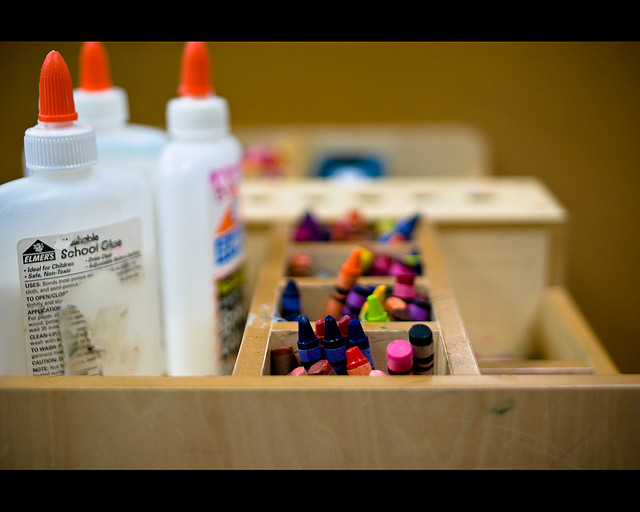It was my dream job and I didn’t get it.
All I wanted was to work in that beautiful, quaint school with the wooden toys and the sheer silks where everything smelled of lavender.
The Waldorf School looked like the calmest, coolest place on earth and when I set foot in the spare, yet homey kindergarten classroom where I was interviewing for a kindergarten aide position, I felt like I’d found the place where I was meant to be.
A few days later, the teacher called and told me the position had been given to someone else and I was crestfallen.
A week after that when she called me again to tell me that the person they’d hired had changed his mind about the job after all, I knew that fate had intervened on my behalf.
Waldorf education was founded by Austrian philosopher Rudolf Steiner in Germany just after World War I and is based on the principles of Anthroposophy.
Waldorf pedagogy believes that the human being is threefold: made up of mind, body and spirit and that all three must be educated. The schools promote creativity, hands-on learning, problem solving, art, music, spiritual growth and service as well as the appreciation of beauty.
I spent a year working in the Waldorf Kindergarten and the lessons I learned have stayed firmly with me ever since. When I became a mother almost four years ago, these lessons and the wisdom imparted to me at the Waldorf school, took on a whole new value and continue to positively influence my parenting.
Parents don’t need to believe in Steiner’s philosophies (yes, some of his beliefs are pretty out there) or even send their child to a Waldorf school to reap the benefits of the core beliefs of Waldorf education. These are simple, good habits that any parent can practice regardless of how they choose to educate their kids or what their family believes.
Kids Need Lots and Lots of Unstructured Play.
If you do nothing else on this list, let your children play freely.
Today’s young people live harried, rushed and over-structured lives where they are shuttled back and forth from school, activities, camps, sports and lessons of all kinds and they have very little free time in which to roam, rest, imagine and learn to entertain themselves.
Stop over-scheduling and let your kids find ways in which to fill their own time.
Stop with the hovering and helicopter parenting. When children are immersed in their play, let them be and only interfere if someone is in danger. If children need redirection, do so subtly and gently.
Turn Off the TV.
I agree largely with the Waldorf anti-TV philosophy, but not wholly. Spending too much time in front of a screen creates individuals who cannot envision pictures in their minds, which is fatal to the growth of the imagination and can seriously hamper reading comprehension later in life. It makes kids lazy mentally and physically. Turn off the TV and get the kids engaged in dramatic play (aka playing pretend).
Fairy Tales and Telling Stories is Important.
We’re talking the gory Grimm’s versions here, too, which I absolutely loved as a child.
I get that some of these original tales can be a bit horrifying to us grown-ups, especially when we are used to the whitewashed Disney versions. Cinderella’s sisters cut their feet to fit in the slipper? Babies get kidnapped by witches? Abusive stepmothers abound, cannibalism is fairly common and all sorts of double crossers commit scores of wicked deeds in fairy tales, but children perceive these stories quite differently than adults.
Don’t worry. Your kids won’t get scared. In fact, these fairy tales actually help children work through their fears and subconscious insecurities about the world.
In addition to reading or reciting fairy tales to your little ones, tell them stories from their lives, your own life and their grandparents’ lives. Make stories up, too. Children love listening to their parents telling stories and speaking directly to them.
Your Kid Doesn’t Need to Read and Write at Three Years Old, Calm Down.
Today’s parents mistakenly believe that the earlier a child learns to read and write the better, but this is a dire mistake.
The thinking is that children need a head start in order to excel in school, but the best head start they can get is by becoming creative and socialized.
How do they do that? Through lots and lots of playing, of course.
Encourage the imagination first and academics will follow. Trust me, there are plenty of Harvard students who couldn’t read and write until they were six. There’s plenty of time.
Spend as Much Time Outside as Humanly Possible.
Nature is enormously restorative and Waldorf schools understand this. Some even have classes which are held entirely outdoors all year round, regardless of weather.
Human beings have lived largely outdoors for thousands of years. Our bodies are durable and made to be outside in the elements so don’t be frightened of nature. It’s the healthiest thing for everyone, kids and grown-ups alike.
Deepen your children’s connection to the natural world by hiking, picking fruit, collecting shells, gardening, rolling in the grass, climbing trees, visiting a farm, playing in the sand at the beach, splashing in a natural body of water—the possibilities for outdoor fun are endless.
You Can Trust Your Children With Knives and Fire, Seriously.
Supervised, of course, but still. It’s safe and reasonable to let your children learn to use real tools, real knives and matches.
Teach them how to use these things with caution and care and let your five year old use a butter knife to cut bread, spread almond butter on his crackers or slice cucumbers for dinner.
Beginning in the Waldorf Kindergarten (where some kids are barely four) children regularly use knives and real tools for their intended purposes. Lit candles decorate the classroom tables and shelves and surprisingly, everything is just fine.
Children can do more than we think—you should see the way the five and six year olds can knit and hammer nails, it’s astonishing and enlightening.
Instill a Strong Sense of Rhythm and Routine.
Children thrive in routine. They feel safe with consistency and when they know what’s coming next. Try to create a sense of daily, monthly, yearly and seasonal routines for your children. It grounds them in space and time and provides a strong sense of security.
It is Perfectly Normal, Healthy Even, For Kids to Get Filthy on a Regular Basis.
I’ve noticed that most of today’s parents are hyper-vigilant about dirt and bacteria and are terrified of their kids getting messy.
Look, just breathe and go with it. Kids need to play in the dirt. Yes, actual soil and sand. They need to splash in puddles, squish berries, feel dough ooze between their tiny fingers. They need to experience their worlds through all of their senses and often this means a full body immersion in things we consider totally filthy. It’s healthy!
Many recent studies blame the explosion of childhood allergies and autoimmune conditions on a “too clean” environment for kids. Getting dirty nourishes the human microbiome with healthy bacteria and strengthens our immune systems.
You can always give them a bath later.
Fill Up the Whole Page.
This was an odd thing I noticed when I worked in the Waldorf school. When the children created art they had little to no direction but they were strongly urged toward filling the entire sheet of paper with layers of color.
This lesson really stuck with me. Waldorf students create magnificent works of art from very young ages and I think that much of that has to do with their being taught to fill the whole page before moving on to a new project. This teaches children to focus and to finish what they start and it creates an appreciation for an aesthetic that doesn’t involve a hapless crayon scribble on a scrap of paper. Their creations are taken very seriously.
Every Moment is a Learning Opportunity.
I like to say that all parents are homeschoolers, regardless of where they do or do not send their children to school.
Children learn from our example so it’s important for adults to comport themselves calmly, assertively and compassionately. Children are in a constant state of learning. They learn through our example, so be mindful of that, and they learn through the experiences we bring to them.
Everything we do with our children is a chance to teach them something.
Show them exotic fruits in the grocery store. Let them weigh lentils in bulk. Explain to them the movement of the tides at the beach. Tell them how the sun moves across the sky each day. Let them stay up to see a meteor shower. Build something with their help.
Practicing Art, Dance, Singing and Handwork Builds the Brain.
Waldorf students and teachers are extremely well rounded. Everyone works on art, music, dance and handwork (knitting, sewing, building, weaving, etc.) regardless of age, gender or inherent talent.
These activities are seen as purposeful work and created a balance human being with an integrated body, mind and spirit. One of the greatest tragedies of our public education system is the removal of the arts from the curriculum in favor of rote memorization and test prep. This kind of “zombie” education creates students who are empty and unfulfilled and who lack passion for learning and living.
Teach your Children Abstract Skills Like Math Through Practical, Hands-On Activities.
People, especially little ones, learn best when they can see how abstract concepts like math and science are applied in the real world. Learn about measuring through building and cooking. Observe science at work in the natural world. When taught this way, children attain a deeper understanding of abstract subjects, plus they learn a lot of useful skills!
Your Children Are On Their Own Path—Respect Their Autonomy and Individuality.
Celebrate your children’s unique spirits no matter how different from you they are or how unexpected they may be.
Our children come to the world through us and we must keep them safe and well until adulthood, but they don’t belong to us. They are their own and their individuality should always be respected and encouraged.
This often means letting them find their own way, their own passions, interests, joys and diversions without parental pressure to conform to any set standard.
The goal is to raise children into balanced, well rounded, confident people who are innovators and free thinkers, not anxious followers desperate to fit in.
Love elephant and want to go steady?
Sign up for our (curated) daily and weekly newsletters!
Editor: Emily Bartran
Photo: Robert S. Donovan/Flickr; fotologic/Flickr








Read 17 comments and reply